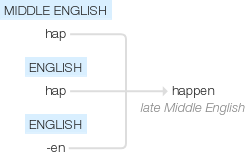Happen
late Middle English (superseding the verb hap ): from the noun hap1 + -en1.
wiktionary
From Middle English happenen, hapnen, augmented from Middle English happen(“to come to pass, happen”), perhaps from Old English hæppan(“to move accidentally, slip”) and/or from Old Norse *happa, *heppa, from Proto-Germanic *hampijaną(“to fit in, be fitting”). Equivalent to hap(“a chance, occurrence, byfall”) + -en(verbal suffix).
etymonline
happen (v.)
late 14c., happenen, "to come to pass, occur, come about, be the case," literally "occur by hap, have the (good or bad) fortune (to do, be, etc.);" extension (with verb-formative -n) of the more common hap (v.). Old English used gelimpan, gesceon, and Middle English also had befall. In Middle English fel it hap meant "it happened." Related: Happened; happening. Phrase happens to be as an assertive way to say "is" is from 1707.
